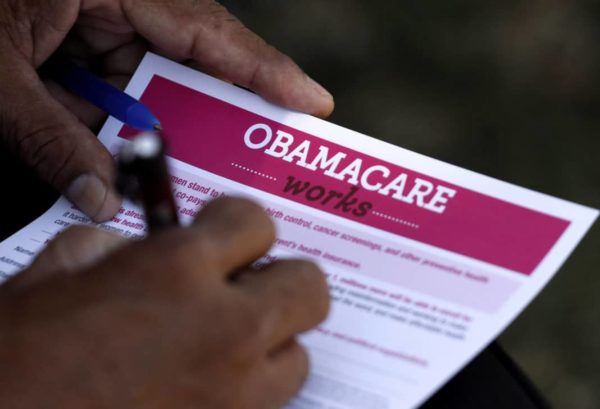 Because many of us feel that his campaign has not yet holistically addressed the Black community, a question that has echoed for the last year and a half is, “How will Donald Trump’s presidency really impact African Americans?”
Because many of us feel that his campaign has not yet holistically addressed the Black community, a question that has echoed for the last year and a half is, “How will Donald Trump’s presidency really impact African Americans?”
To answer this question, Xavier Epps, a former Wall Street broker and the founder of XNE Financial, a Virginia-based financial firm, has come forward to share some of his nuanced and nonpartisan insights, as well as some pros and cons of Trump’s key proposals and how they’ll potentially affect Black communities economically over the next four years.
Epps, one of America’s top financial advisers, has managed millions of dollars for both individuals and small businesses in the past few years alone. He’s also been cited by companies such as Experian, Equifax, American Express, MSNBC, Sallie Mae, Power 30 Under 30™ and others for his financial advice.
For starters, Epps believes that many African Americans may be overly pessimistic about the post-Trump era. To give an example, he pointed out the mass fear that Trump’s election would result in a stock market crash and worldwide recession.
“On the night of the election, the Dow Jones was down 600-800 points in the futures market, but to everyone’s surprise, the Dow Jones hit a new record high the very next day,” he said.
The stock market continues to thrive and has even hit another record high. According to financial news outlets such as Bloomberg, President-elect Trump could push the U.S. economy and stock markets to new records. Also, CNNMoney‘s Fear & Greed Index, an investor’s tool that visually emotes stock market activity, has been ranging from “Greed” to “Extreme Greed” ever since the election.
Mr. Epps believes that we may see more of these good turnarounds once Trump officially takes office, but we should be careful about making sure claims for now.
“Uncertainty is important in our culture and our economy and there’s so much uncertainty that comes with Donald Trump. On the flip side, with Hillary Clinton, there was total certainty. We knew exactly what she was going to do. She wanted redistribution of wealth, a bigger government, more regulation, more rules and more interdependency,” Epps said.
With that said, here are the five proposals that likely will have the most impact on Black communities in the post-Trump era.
A couple weeks ago when Xavier and I discussed Trump’s new tax plan, which seeks to decrease the current number of tax brackets from seven to three and eliminate the head-of-household filing status, he had this to say:
“I’ll be honest, it’s going to hit single parents the hardest, no matter what their race is, and it will definitely benefit the wealthiest individuals.”
Unfortunately for many African-Americans, who have a 54-percent rate of single-parent-headed households, according to Pew Research, the removal of the head-of-household status will likely have devastating effects.

Under Trump’s Administration, the Earned Income Tax Credit (EITC) tax exemption, which is currently $3,373 per qualifying child, may also be eliminated and replaced by a child care expenses deduction instead and as a result, many lower-income families will now have to pay taxes out of pocket.
Sidenote: If this proposal is passed, it will eliminate what is known as the “tax time baller.”
“We will see a huge drop in the amount of taxes that millionaires have to pay and his reasoning behind that is to give them an incentive to create more jobs. It’s similar to Reagan’s trickle-down economics plan.” Epps said.
Epps also noted that Trump’s tax proposal is not likely to pass through legislation in its current form and that he will have to concede on some of his policies.
“Let’s just consider this Tax Plan No. 1 because I guarantee you, he will make some changes to this his first 100 days in office,” Epps said.
When it comes to the Affordable Care Act, as a very hands-on financial advisor and tax preparer, Epps is more than qualified to make an assessment of its effectiveness and success. His conclusion? Obamacare has been extremely disadvantageous for the African American community.
While recalling a tax preparation client of his who was African American and a single mother of four who didn’t have insurance for herself or children, you could hear the frustration and sadness in his voice. “Her tax refund had gone from $8,000 to $5,000, thanks to IRS-imposed penalties,” he said.

Epps is adamant that Obamacare is more of a political power move that opened doors for bigger government and a siphoning of more tax dollars and more power for the Internal Revenue Service.
“Trump’s repeal of Obamacare is actually a great thing because it’s the most expensive health care plan ever put in the marketplace for insurers, the insured and the uninsured,” he said.
Many credible sources have stated that the ACA is a bubble bound to burst. According to this article published by Forbes, Obamacare insurers are in need of a bailout, which may cost taxpayers $8.3 billion from deficits from 2014-2015 alone and that this occurred “despite massive government subsidies.” Many other political and financial analysts have even argued that Obama’s current attempt to revive Obamacare may actually be illegal.
Lastly, in terms of Trump’s repeal, Epps stated, “This [proposal] would also allow for cheaper premiums because insurers won’t be mandated to provide certain benefits as they have under Obamacare. Trump’s repeal of Obamacare will benefit everyone and will create immediate savings ability for people with lower income,” Epps said.
Trump’s Immigration Stance
“Throughout his whole campaign, [Trump] has been big about one thing — building a wall. This poses a huge question for the critical thinker: Why would he be willing to get rid of the most profitable individuals in the country?
“What people don’t understand is, Trump’s immigration policies, economically, will only really affect the bottom line of companies in the tech, construction, industrial, commercial and residential sector. What would happen is the cheap labor will get replaced with more expensive labor.
“There are 26 million Hispanics in the U.S. labor force and only 19 million African-Americans as of October, thus making us [African-Americans] a super minority in this country. Trump’s overall stance on immigration can definitely benefit the African-American community because there will be a huge and immediate job market available for skilled labor and better-paying jobs as a result.” Epps said.
To back Epps’ claim, a recent report by Fortune with the headline “Tech Industry Could Be ‘First to Suffer’ from Trump’s Immigration Stances,” published a week after our conversation, stated: “The tech sector says it needs more [foreign] workers than the program currently provides because there aren’t enough skilled Americans to fill those jobs” as they are in fear of losing their H-1B employees.
The article also states “President-elect Trump has characterized the [H-1B] program as a way for companies to undercut American wages with cheap foreign labor. He proposed that the program be restricted, that companies be required to hire Americans first, and that the prevailing wage for H-1B workers be raised.”
Ultimately, Epps does not believe Trump’s immigration proposal will pass to the levels he’s pushed for during his campaign.
“Employers would start coughing up the cash if they really want the job to be done, but this would also result in product costs going up and the consumers would need to have more disposable income,” he said.
“As it stands, this would be a double whammy and there would have to be a system of checks and balances in place to make this work. Also, keep in mind that most of this is totally hypothetical.”
Infrastructure and Government Spending
“Trump is really huge on infrastructure. This includes buildings, roads, railroads, bridges, streets, schools, the military, you name it.
“With someone that big on infrastructure, he’s likely to be the president that is going to spend a huge amount of money on rebuilding the country in a way that all Americans would gain from.
“[Trump’s] government spending and re-allocation plan means a lot of funds for general contractors, DoD and small businesses that work with the government, which will definitely create even more higher-paying job opportunities.” Epps said.
Epps believes that Trump’s economic plan and him being big on infrastructure will stimulate the economy and empower communities that would have remained economically disenfranchised otherwise and also allow African-American communities to better establish our own micro-economies as a result.
The Unemployment Rate
“According to most media outlets and statistics, the current U.S. unemployment rate is 4.9%, but the real unemployment rate is actually nearing 10% because it consists of the marginally attached, discouraged workers, those working per diem and the workers who aren’t getting at least 30 to 40 hours per week,” Epps said.
Epps also said many people have fallen off the government’s reporting dashboard when they exit the job market because they cannot find a job. This makes the unemployment rate much higher than what is being reported, especially for African-Americans. A study published by the Economic Policy Institute confirms that there are “missing workers” who are not reported and says it is actively working to bridge this gap.

In the past, Trump had been chastised for making claims that employment rates in our communities were as high as 50% in some age groups and his once-opponent Bernie Sanders is on record making those exact same claims. Though these claims may not be accurate, both Trump and Sanders were onto something, based on Epps’ revelations. More recently, CNN Money reported that President-elect Trump does acknowledge “the real unemployment rate” and plans to tackle it.
Lastly, Epps said, “This is definitely an unpopular opinion, but I do believe that under the Trump Administration, African-Americans will have access to many more opportunities than we had under the Obama Administration.
“It’s undeniable that President Obama spent his time focused on intersectionality and policies that benefited other communities much more than ours.”







